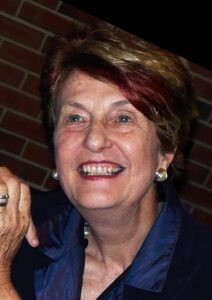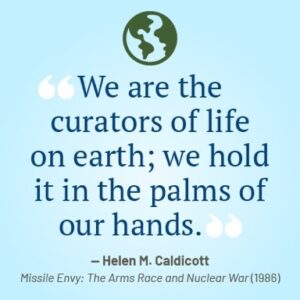Humanist Profile: Helen M. Caldicott, Physician and Peace Advocate

This month, the American Humanist Association (AHA) is celebrating Women’s History Month through the lens of “Atheist World Builders, Women, and Matrilineal Legacy” by uplifting the stories of humanist and atheist women who’ve made a positive impact on the world. Today, we highlight Dr. Helen Caldicott, a physician, peace advocate, and humanist whose lifelong anti-nuclear activism raised awareness about the health and environmental hazards of atomic power and nuclear weapons. While the threat of thermonuclear war may feel like an echo of the past, Putin’s February announcement about suspending Russia’s participation in the new START treaty reminds us that nuclear weapons remain an enduring problem—and a threat. The dangers of nuclear power also persist, and it was Caldicott’s work that largely established our fundamental understanding of it, including its effects on humans and the environment.
Helen Caldicott was born on August 7, 1938 to a middle class family in Melbourne, Australia. She attended public school and graduated with a degree in medicine from the University of Adelaide in 1961. The following year, she married William Caldicott, a pediatric radiologist, who would later join many of her campaigns.
Her interest in nuclear issues began after reading the 1957 Nevil Shute novel, On the Beach, which depicted a nuclear holocaust set in Australia. While working as a pediatrician in South Australia during the 1970s, she discovered radioactive contamination in the drinking water due to France’s nuclear testing over the South Pacific. Having witnessed the children who were dying from leukemia and cancer, she began an educational campaign in Australia, New Zealand and North America on the hazards of nuclear pollution. The effort almost single-handedly convinced Australia to boycott French products, bring France before the World Court, and end its nuclear testing.
After moving to the United States, Caldicott founded Physicians for Social Responsibility and the Women’s Party for Survival (later renamed Action for Nuclear Disarmament). In 1980, she founded Women’s Action for New Directions (WAND), a group dedicated to redirecting government spending away from nuclear energy and arms.
 Upon learning about the impending U.S. deployment of cruise missiles that would end arms control in 1979, Caldicott left her medical career to bring attention to what she called the “insanity” of the nuclear arms race and the world’s growing reliance on nuclear power. She reinvigorated Physicians for Social Responsibility (PSR), a group launched in the early 1960s that had since faded. With a small group of other volunteers, Caldicott recruited 23,000 physicians to join PSR in a campaign to educate the US public about the medical implications of both nuclear power and nuclear war. PSR was ultimately awarded the 1985 Nobel Peace Prize for “spreading authoritative information and […] creating an awareness of the catastrophic consequences of atomic warfare.”
Upon learning about the impending U.S. deployment of cruise missiles that would end arms control in 1979, Caldicott left her medical career to bring attention to what she called the “insanity” of the nuclear arms race and the world’s growing reliance on nuclear power. She reinvigorated Physicians for Social Responsibility (PSR), a group launched in the early 1960s that had since faded. With a small group of other volunteers, Caldicott recruited 23,000 physicians to join PSR in a campaign to educate the US public about the medical implications of both nuclear power and nuclear war. PSR was ultimately awarded the 1985 Nobel Peace Prize for “spreading authoritative information and […] creating an awareness of the catastrophic consequences of atomic warfare.”
The awards and honors for her passionate work have continued throughout her life. Her short film, If You Love this Planet, which outlined the development and devastating effects of atomic weapons, won the 1982 Academy Award for Documentary Short Subject. The AHA named her the 1982 Humanist of the Year for her advocacy and activism for world peace. In subsequent years, she received an additional twenty-one honorary degrees and was listed by the Smithsonian Institution as one of the most influential women of the 20th century. In 2009, she was designated a Women’s History Month Honoree by the National Women’s History Project.
Caldicott now serves on the Advisory Council of the Nuclear Age Peace Foundation. She continues her activism with lectures on the environmental dangers of nuclear power, radioactive waste disposal, and sustainability. Her most recent book, Sleepwalking to Armageddon, was published in 2017.
